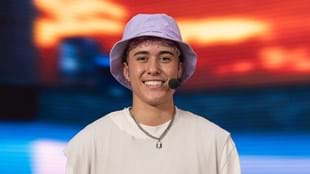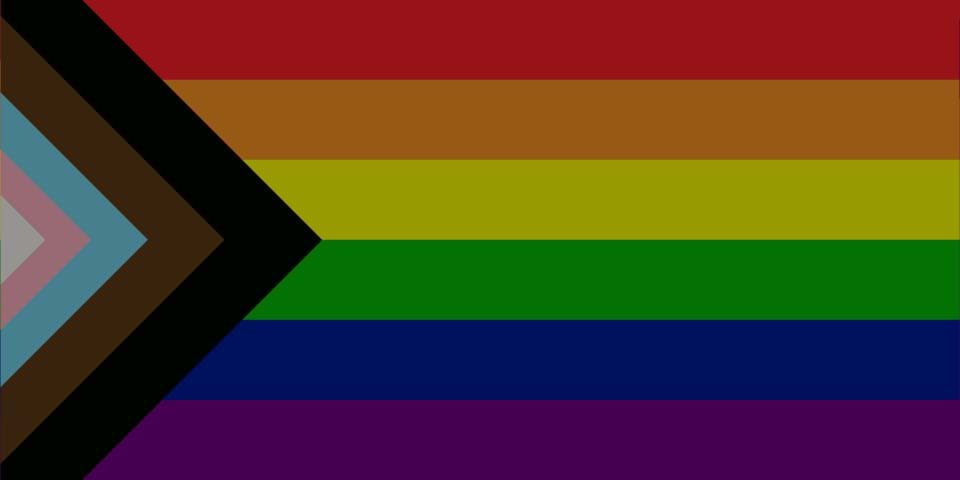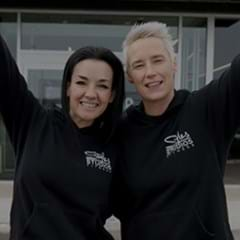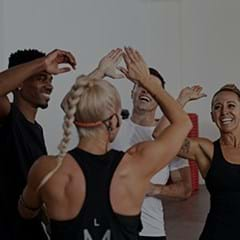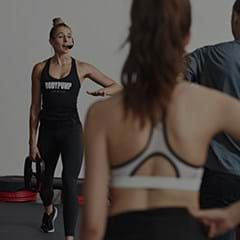Sarah Shortt: Hi Meno! How did you first get into teaching?
Meno Thomas: Actually, I never wanted to be an Instructor, and that’s probably because I was exposed to the fitness industry from such an early age. My Mum [Mid Thomas, Masterclass Presenter on BODYATTACK™ and BODYPUMP™] was always teaching classes at the Les Mills Auckland City club and she’d get me and my twin sister helping out at all the Instructor events, so being around it all the time initially put me off.
Fitness had always been a big part of my life. My Dad was a rugby player – he played for Poneke – and my Mum has been involved with Les Mills for many years. They even got married in the gym! They’re both athletes; their whole ethos is eat, work and train. They wanted me and my sister to play sports, so I was always in the top teams for netball, volleyball and rugby.
Eventually I decided to give up sports because I just wasn’t passionate about it, and my Mum was like, okay, you don’t have to play sports, but you do have to do something. At the time, she was the club manager of Les Mills Hutt City and I went along to a BODYJAM™ workshop, just for fun. I was down the back just doing my thing and I got approached by this wonderful Instructor called Sheree Marsh – she’s a bit of a legend down there – who told my Mum that I should be teaching. I was 15 at the time.
I suppose what attracted me to BODYJAM was that it aligned with my passion for music. I was always into music in high school, playing guitar and singing, and I love the musical journey of BODYJAM – all those different genres combined with the different dance movements. It’s just a beautiful thing and it felt really right for me. But actually, I’d never had formal dance training. Although I’d always wanted to get into dance, I was too scared to put my foot in the door. BODYJAM opened that door for me.
After I’d been doing BODYJAM for a couple of years, I started going to other dance classes. I found this incredible community called ‘More Than Moves’, which is about celebrating diversity, embracing your community, and just bringing a group of like-minded people into one room who enjoy music and movement.
Teaching group fitness at such a young age really helped my confidence, especially going through my journey with transitioning into being transgender. It’s been so helpful, not only for teaching, but also in helping me to stand for who I am today. It definitely helped me to find out who I really am.
15 is pretty young to start teaching! Did this help you in other areas of your life?
I’ve always been a loud person, but I could get quite shy when it came to meeting new people. I didn’t really know what to say. Teaching group fitness at such a young age really helped my confidence, especially going through my journey with transitioning into being transgender. It’s been so helpful, not only for teaching, but also in helping me to stand for who I am today. It definitely helped me to find out who I really am.
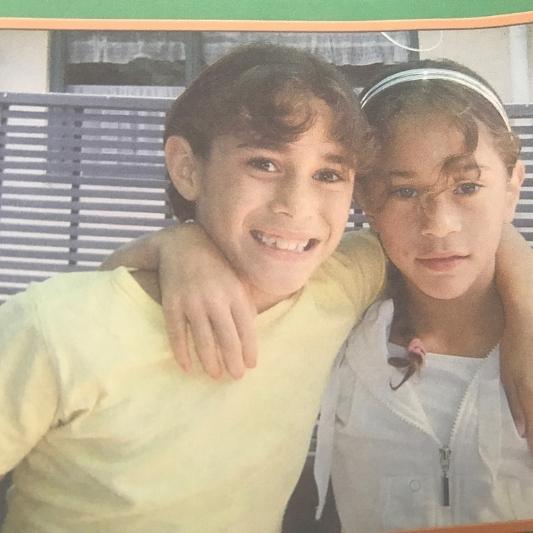
Can you share a little of your journey with transitioning?
I came out at a very young age. I always knew I was different from my twin sister because I was quite tomboyish, growing up. And I was like, why? Why am I so different from my sister? She was a very girly girl, quite into makeup, dressing up and all that stuff. And I was too, but I always admired my father – the way that he looked and the way that he dressed.
I remember being in kindergarten and just not feeling comfortable wearing a dress, crying because I wanted to get out of it. My sister was like: “Get over it, you look pretty.” But I didn’t want to look pretty.
I did some self-education around the age of 12 and I asked my Mum: “What does this mean?” We had a really great conversation about it and then I came out a couple of years later. Once I came out and told people who I actually was, everything started to make sense. I understood why I felt so different to my friends who are girls, and why I wanted to hang out with boys so much. When I found out what transgender meant, it made absolute sense why I’d been feeling the way I had since the age of about three.
I come from a Polynesian family. My Dad’s full Samoan and my Mum is Maori and Scottish. When I came out to my entire family and close friends at the time, they were so supportive. They were just like: “We already kind of knew, but we’re really proud of you for coming out.” I was nervous to tell my Nan and Papa on my Dad’s side because they’re very religious and I didn’t know how they’d react, but they were so supportive. They said: “As long as you’re happy, we only pray that love and happiness come your way.” They’re amazing.
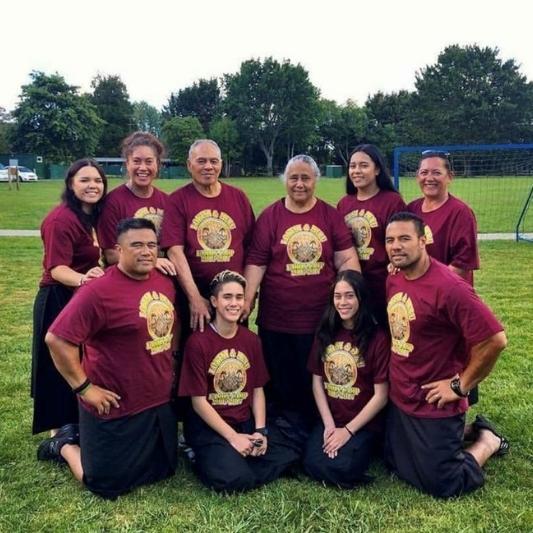
What was it like at school?
I went to an all-girls college. It was a Catholic school, so quite religious, but when I came out I chose not to leave, because I wanted to protect my sister.
I’m the elder twin, by two minutes and 30 seconds, and so I always want to look after her. You know, growing up in a Polynesian family, we take responsibility for protecting our younger siblings. If a younger sibling does something wrong, you’re the one that’s in trouble – not them – because you should have been watching them. That’s how it is. I didn’t want to leave my sister in the school, but I also loved my music teachers and music lessons, plus I had amazing friends there.
I had a really good experience at that school, and they never made me feel uncomfortable. I already felt at ease with everything, and was honest about who I am. I had a great support system, which was really special, because I was already cutting my hair and dying it blond. I was already being called Justin Bieber, which I still get.
After I left college, I discovered the world of deejaying, and that helped me to find myself even more. In some ways, deejaying is similar to group fitness because they're both about creating an atmosphere and environment that keeps people going. They both give me that high that comes from just making people happy.
I’m lucky that Wellington is a pretty diverse city. You know, it wasn’t like I was the outcast, although I do understand what it’s like to be an outcast. My close friend of mine, Daphne Seyb who owns More Than Moves, said to me: “Being the outcast is your superpower, because you’re unique and different to everyone else in society. And the more you lean into that, the greater your power.”
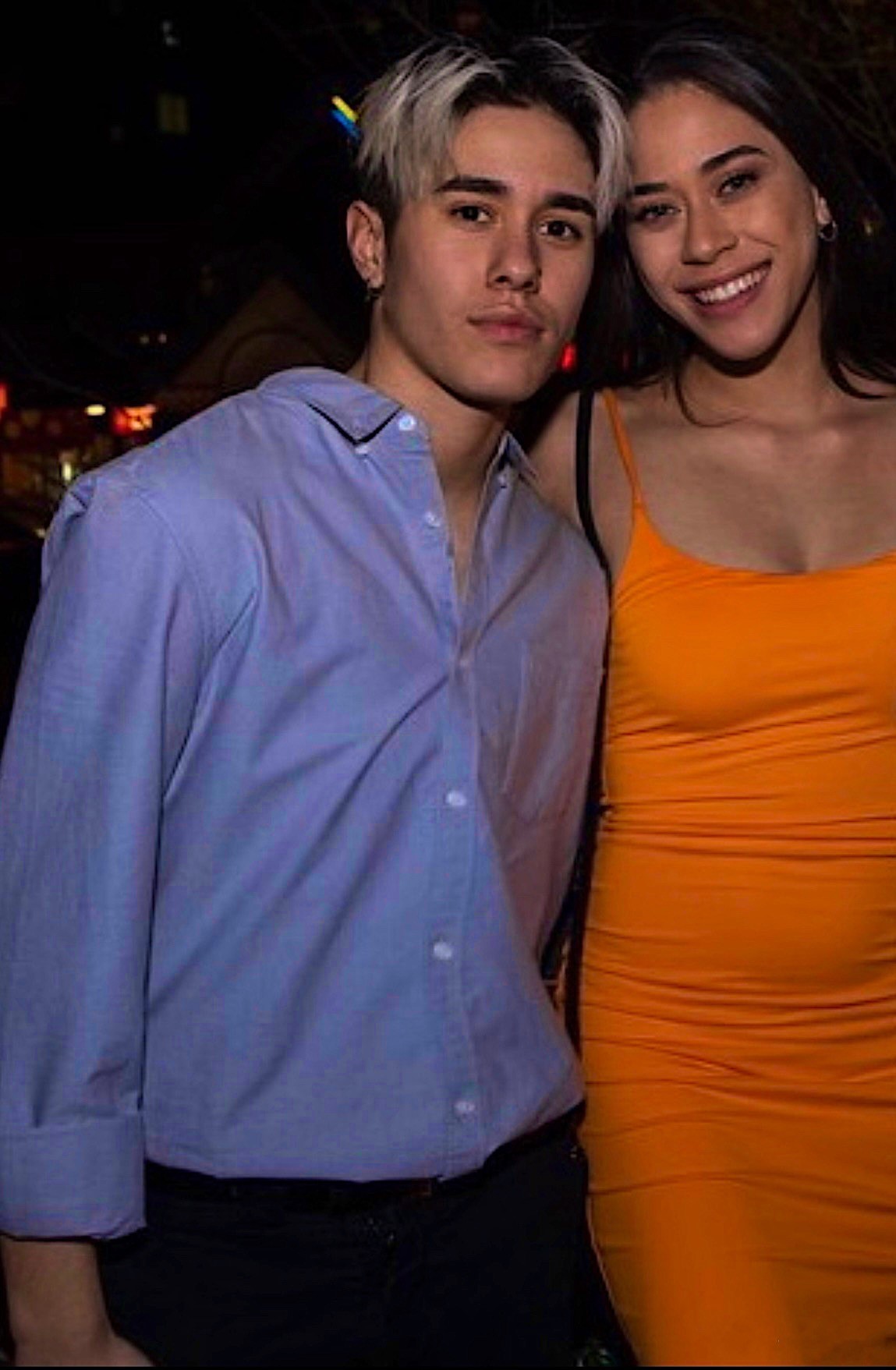
You’ve just moved up to Auckland from Wellington. What prompted that move?
For me, it's all about giving things a go. It's a big deal for me because I’m very close to my family and I’ve never lived away from them before. But I love learning and there’s so many more opportunities up here for me to progress both in deejaying and group fitness. I figured I need to just give it a go.
I used to never try, but my Mum was the one who said to me, you can fail, but at least give things a try because you never know the outcome. There was this one time, at high school, that I didn’t want to go to my exams. I hadn’t studied for them, hadn’t taken them too seriously, and so I didn’t want to go because I was certain that I’d fail. Mum and I had this massive argument and then she dropped me outside school and said: “You’re going to go in there and you’re going to try your best from what you do know. You’re going to give it a go.” And you know what? I passed! At that moment, something just clicked for me.
I actually have a learning disability. My sister and I were born at 27 weeks – 13 weeks early. My Dad could hold us in one hand. We were in an incubator in ICU at the beginning and I received extra oxygen. And while oxygen is great for the muscles, it can damage the brain a bit because it’s pretty harsh. My disability is called dyspraxia which means my left and right brain don’t talk to each other very well; the doctors said that I just take longer to process and learn new things.
So, when it came to this exam, my Mum said, you just need to try and try again, and then try again and again until you get it right. I’ve always been very open about my disability because it’s nothing to be embarrassed about. It is what it is and I’ve just learned to live with it. I know now how I learn. I have to just keep picking at something, and eventually it opens up.
Teaching group fitness is not only a way to feel physically good and healthy, but it's also been great for my learning process. I learn by doing, by physically drilling the timings or listening to the music over and over again. I can’t learn just by reading the notes. So trying is definitely one thing that I do now. If I fail, it is what it is, but I always give it my best effort. It’s how I learn and how I keep moving forward.
I do understand what it’s like to be an outcast. A close friend said to me: "Being the outcast is your superpower, because you’re unique and different to everyone else in society. And the more you lean into that, the greater your power.”
Group fitness can be pretty competitive, especially up here in Auckland. How do you cope with that side of the industry?
I’m not a competitive person. I don’t like competing, because I like helping people. I did have one experience though that took me by surprise:
When I taught my first ever BODYJAM workshop, down in Wellington, I was 17 and I was teaching with Nicky Lord, who’s appeared in lots of Masterclass videos. Just before we were about to start, this person came up to me and said: “The only reason you’re up there is because of your Mum.”
Initially I was a bit upset, but then I decided ‘You know what? That’s their opinion. And that’s okay. I get it.’ That person might have worked their whole life to get to where I was and they might never get that opportunity. I’m actually really proud of how I handled that situation.
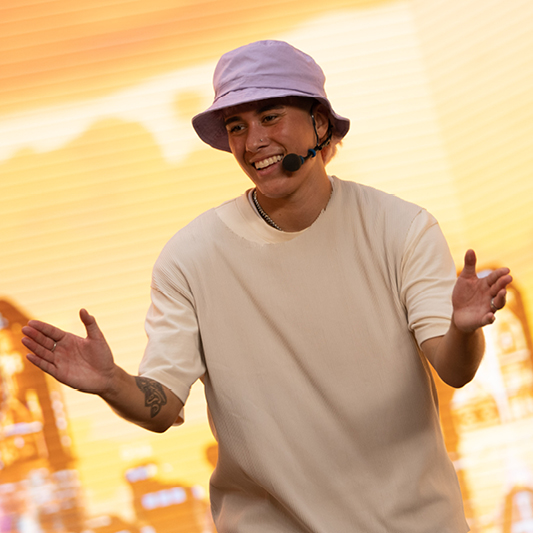
Your story is very inspirational! What prompted you to share it with the wider Les Mills family?
The more I started to accept who I am, the more comfortable I felt with myself. I’ve had a pretty cool journey, and I’m still going through an incredible journey. I’m glad if I can bring some light to those who might be going through similar times, who might not have the support that I do.
Before I came out, I always felt uncomfortable, unsure. I wouldn’t say it was tough, but it was confusing. When we found a name for it, it was like we hit the nail the head. It was like, ‘This makes absolute sense.’
I found such a passion in group fitness and helping people to feel good about themselves. I love doing Masterclass and Quarterly Workshop, but at the end of the day I just really want to help the people that walk through the studio door. For me, it’s about getting people to feel a big rush of feeling good about themselves and leave on a high. You never know what people are going through, so if I can shine a little bit of light for 55 minutes, that’s a bonus.
I’ve been blessed with an incredible family who talk about everything. Communication is key in our household. My friends always say, man your family’s so cool, we feel at home in your house. And that’s the exact same vibe I want to bring to my classes. I want everyone to feel comfortable to be who they are.
I have empathy for the people who might want to say something nasty about me – like I’m not good enough or not strong enough. Maybe I’m not tall enough, or masculine enough. But how I look at it is: ‘You know what, I’m here to give me. And if you don’t accept that, that’s okay. But I’m going to continue to give me. And if you decide you don’t want to be on this ride with me, that’s okay, I’ll just drop you off at the next station.’
Meno Thomas is a BODYJAM Trainer/Presenter/Instructor and a BODYCOMBAT Presenter/Instructor. He is a self-employed DJ and lives in Auckland.



